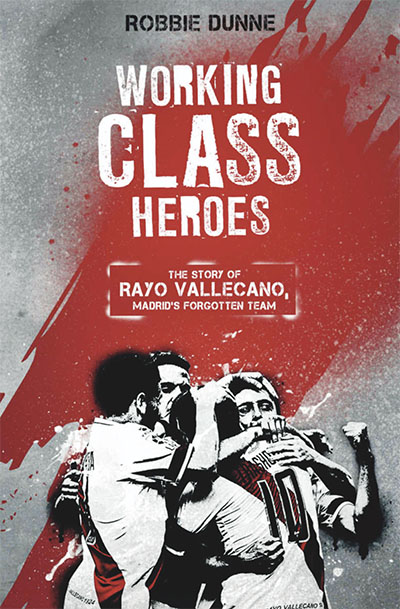
by Robbie Dunne
Pitch Publishing, £9.99
Reviewed by Huw Richards
From WSC 374, March 2018
Buy the book
If Brighton-based Pitch Publishing did not exist, football fans would need to invent them. Nobody gets rich writing for them, and best-sellerdom is strictly localised, but books which explore and celebrate the offbeat and unfashionable are welcome simply by virtue of existing.
Robbie Dunne’s study of Rayo Vallecano typifies their output, following Euan McTear’s Eibar the Brave (2015) in forsaking the made-tedious-by-over-attention Lionel Messi/Barcelona v Cristiano Ronaldo/Real Madrid axis for less understood but more illuminating recesses of the Spanish game.
Like McTear, Dunne builds his portrait of a distinctive club – as he writes “it is necessary to see Rayo Vallecano through the lens that is their social setting, because that is how they identify themselves” – around a diary. The tumultuous 2016-17 season saw Rayo employ three different coaches, dice with consecutive relegations and lose new signing Roman Zozulya after organised fan protests against neo-fascist associations.
As well as enabling publisher-friendly rapid completion of his manuscript, the format suits Dunne’s personal trajectory – he admits to starting with limited Spanish language skills and local knowledge.
So the reader learns as Dunne does, and learns plenty. He did the right things, engaging with the Bukaneros fan group, and talked to the right people including historian Juan Jimenez Mancha, football journalists and legendary defender Jesús Diego Cota. He immersed himself to the point that he only stops enjoying it when he starts to worry about relegation.
He is a decent reporter. He “gets” Rayo and builds a vivid picture of a club who have traits in common with Hamburg’s hipsterish St Pauli, but are in reality more class-conscious, more localised in their barrio of Vallecas and politically harder-edged.
Almost everything you want to know about Rayo is here. The problem, with no index or evident organising principle beyond the diary, is finding it. While well read in cultural studies, Dunne admits to being no historian. This shows both in missing the role played by anarchism alongside socialism in forging Vallecas’ political culture and a structure which, like Eric
Morecambe, strikes all the right notes, but not necessarily in the right order. So readers encounter José Ramón Sandoval as an embattled 2016-17 coach, but only later learn that he coached the team promoted, against ridiculous odds, to the Primera in 2011. Rayo’s formative modern experience, the two decades of José María Ruiz-Mateos’ proprietorship, matching left-wing fans with dottily right-wing ownership, also receives belated treatment.
A good editor – none is acknowledged – might have done some constructive reordering as well as curbing Dunne’s tendency for overlong sentences. But flawed as it is, this book is welcome. An enjoyable read, it fills a gap in the English-language literature. It enthused this Rayo follower of 23 years standing – as well as, one hopes, many converts – with desire before much longer to revisit the crumbling, three-sided Estadio Vallecas, as joyously idiosyncratic as the club and fans who occupy it.